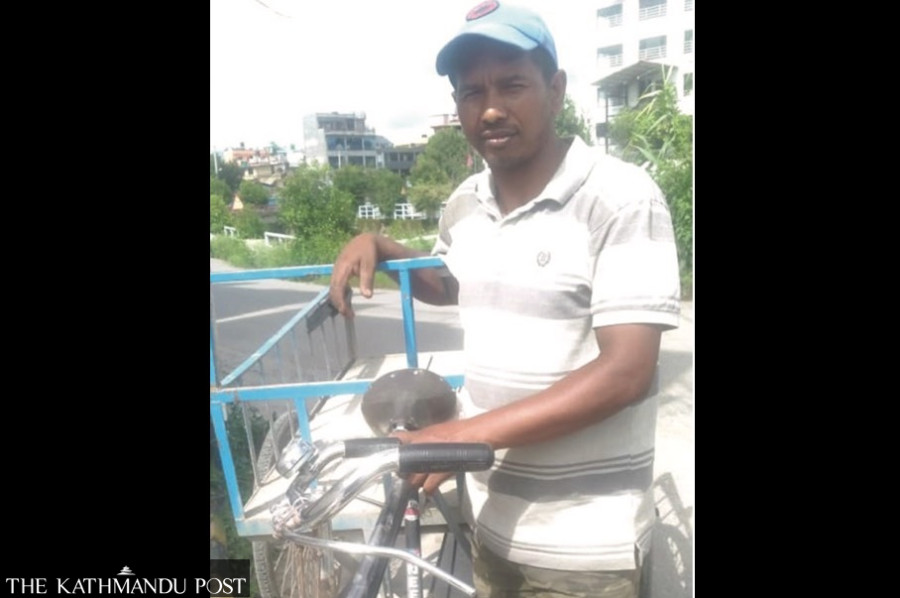National
Prioritise the poor in economic revival plan, experts urge government
The Cabinet on July 13 decided to announce a special package for economic revival within a month.
Prithvi Man Shrestha
It has been difficult for Hem Bahadur BK, 42, a construction worker, to survive in Kathmandu with the reduced income due to little work that is available in recent days amidst a slump in economic activities after months-long Covid-19 lockdown.
BK, who hails from Sindhuli, lives with his wife and their two sons at a squatter settlement in Thapathali. All four members of the family are daily wage workers.
But with the second wave of Covid-19, their daily income has come down sharply.
BK said he used to make Rs1,500-2,000 a day in normal times. These days he makes Rs500-1,000 per day.
“When there was a strict lockdown in the early days [in April and May], it was very difficult for us to survive as all four members of my family were without work,” said BK. “Unlike last year, the government also didn’t give us any food this year.”
The plight of Ram Bahadur Shrestha is no different than BK’s. The 47-year-old operates a tractor to deliver goods.
He owes months of back rent to his landlord because he was unable to earn during the last two lockdowns. He rents a room at Koteshwor for Rs5,000 per month.
Shrestha, who hails from Chautara, Sindhupalchok, spent nearly 10 months last year and three months this year in his village during the first and second lockdowns.
“I have promised the landlord that I will pay after earning enough money,” said Shrestha, who returned to Kathmandu only last week.
He said he has yet to pay the rent for two months last year and three months this year.
He relies on a salary of Rs20,000 provided by the tractor owner. But, during the lockdown, he was not provided a salary as there was no work.
Even though the lockdown imposed since late April has affected people from almost all sectors, the poor people employed in the informal sector have suffered the most.
While the lockdown imposed in the wake of the second wave of the pandemic was not as strict as it was last year, it was still difficult for the people like BK and Shrestha who rely on daily wages for a living.
There is hardly any word in the budget for the current fiscal year 2021-22 to provide relief to the downtrodden people who suffered badly in the wake of the pandemic.
The budget has made provisions for training in handicraft making, plumbing, electronics, cooking, beauty care, masonry, and carpeting, among others, for the people who lost their jobs at home and abroad. It also talks about implementing the Prime Minister Employment Programme with necessary revisions to provide at least 100 days of employment.
However, there is no specific provision of relief measures for the wage-workers even though some of the provisions such as providing free electricity up to 20 units for the period of lockdown and free water up to 20,000 litres per month could provide certain reliefs to them.
Now the government has decided that it would introduce a special package for the revival of the economy battered by the pandemic, and experts and stakeholders say that the workers in the informal sectors should be prioritised for relief and employment.
As per the Cabinet decision of July 13, the government will introduce a special package to revive the economy within a month.
“There are many relief packages for businesses in the current fiscal year’s budget but not a single package for the informal sector workers who rely on daily wages,” said Keshav Acharya, an economist. “The state has done injustice to them and a new package should address their issues.”
He said that the government could provide cash directly to the poor based on their identification by the concerned ward offices of their local units.
“Last year, while distributing goods to the poor during the lockdown, we heard about the officials benefiting in the procurement of goods meant for the poor. With the new provision of transferring cash through the banking channel, the beneficiary will get all the benefits. Even if they misuse the cash, it is better than officials misusing the amount meant for the poor,” said Acharya.
Even though the Cabinet decided to announce a special package to revive the economy, the government is yet to prepare any specific plan.
“The discussions are undergoing from different quarters regarding the package but those discussions have not taken any concrete shape,” said Suman Dahal, chief of the budget division of the Finance Ministry.
Though there are speculations that the government could amend the current budget to introduce the rehabilitation package, Dahal said no homework has been done to amend the budget.
Irrespective of whether the government introduces relief packages through an amendment to the budget or other means, stakeholders and experts say the poor section of society should be the major focus of the rehabilitation package.
“I think the government can help the poor in two ways— by providing cash for their work and providing interest-free credit without collateral to run small businesses,” said Jitaram Lama, president of the NGO Federation, Nepal, a grouping of local NGOs in the country.
Even for BK it would be in his best interest to find work continuously.
“How long can we get relief from the government? I just want the government to ensure that we can get work and earn,” said BK.




 9.7°C Kathmandu
9.7°C Kathmandu














